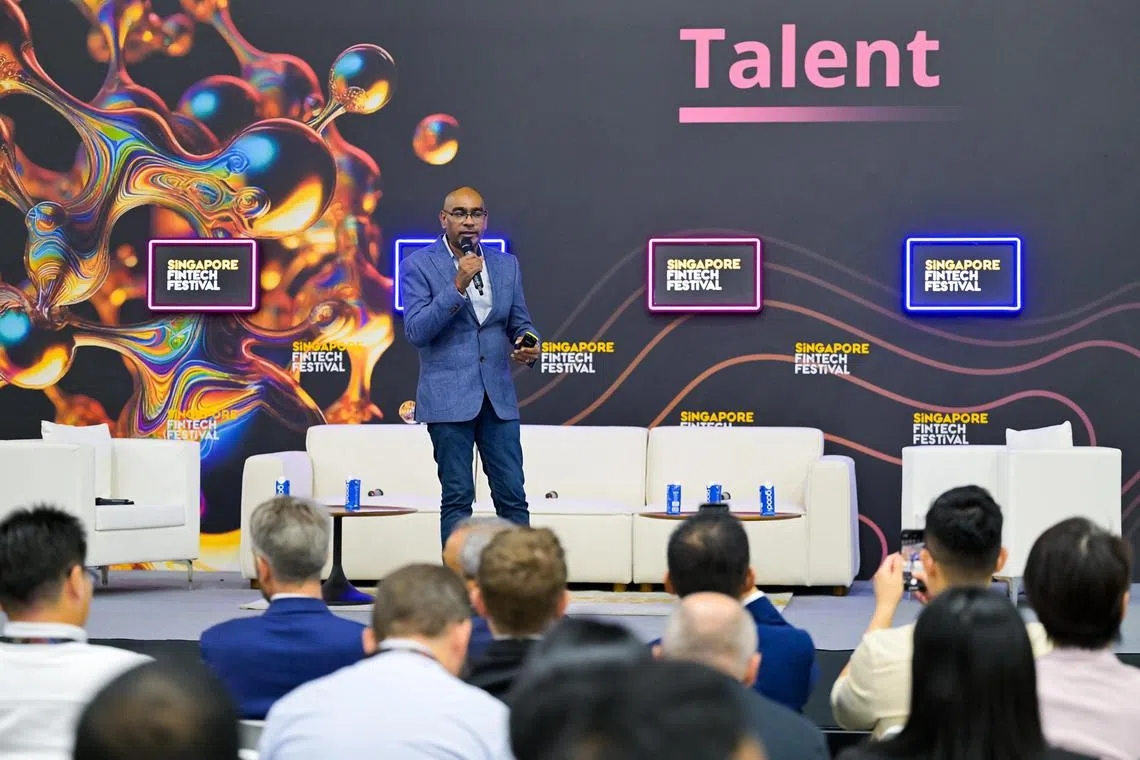Mix of tech knowledge and other skills needed for fintech career, as hiring slows: Report
Sign up now: Get ST's newsletters delivered to your inbox

Mr Nesan Govender, Accenture’s talent and organisation lead for South-east Asia, said artificial intelligence has made the workforce more efficient.
PHOTO: SINGAPORE FINTECH ASSOCIATION
SINGAPORE – A blend of hard and soft skills will become more important, said various speakers at the Singapore FinTech Festival, as hiring slows for fintech jobs.
Financial institutions are taking a cautious approach to recruiting, with 57 per cent pointing to a hiring freeze or forecasting a decrease in headcounts for tech workers, noted a report on Nov 7, while just 22 per cent expect to take on more staff.
Fintech firms seemed slightly more optimistic – 27 per cent said they are looking to increase their tech headcount, compared with 13 per cent of banks and asset managers, noted the report by the Singapore FinTech Association (SFA) and Accenture.
Financial players are adopting flexible workforce models and continuing to outsource non-essential capabilities while also developing talent internally for long-term strategic roles, it found.
Mr Nesan Govender, Accenture’s talent and organisation lead for South-east Asia, said artificial intelligence has made the workforce more efficient, disrupting key financial services roles such as test engineers and data analysts.
Take generative AI. SFA and Accenture noted that 94 per cent of banks and asset managers, and 73 per cent of fintechs are exploring or have implemented gen AI in areas such as sales and marketing, as well as data processing and management.
The report involved a market-wide survey, interviews with key industry leaders and other research. Most companies said that code generation and summarisation are the top tasks that will be automated.
Building a career in fintech takes more than just having tech-related skills.
Mr Govender said there is growing demand for the “techno-functional connector” – individuals with strong technical AI skills, as well as critical thinking, creativity and leadership abilities.
“If you understand how technology operates, and you understand how people behave, together, that will impact the way you can drive business outcomes” he said.
“So the technology professional of the future needs to have that combination of both technical skills, business acumen and the human fluency skill sets.”
SFA president Shadab Taiyabi said employers have a role to play as technology develops. “To thrive in the evolving fintech landscape, we must invest in our workforce and expand development channels to unlock the full potential of the talent pool.”
Mr Alvinder Singh, who heads the Monetary Authority of Singapore’s innovation acceleration office, said the education sector is catching up with gen AI.
“Education in tech is still mainly focused on traditional programming languages, and building applications and maintaining systems using these programming languages. These remain sacrosanct,” said Mr Singh in a panel discussion moderated by SFA chief executive Reuben Lim.
The good news is that many tech roles remain relevant – for example, programmers are still needed to maintain a bank’s back-end systems – even as new roles are being created to support other functions, noted Mr Singh.
“Tech is actually a very unique space (as you can’t) easily point to a singular role that is completely redundant over time.”
Meanwhile, financial institutions must tailor their benefit packages to attract and retain talent, added SFA and Accenture.
This includes redefining “rewards” – for example, by including learning and development budgets, health benefits, flexible leave policies and lifestyle discounts.
Human resource departments plan to focus on flexible work arrangements, and employee recognition and engagement, in the next two years, noted the report.
Employees largely view rewards and opportunities as the biggest factors for joining or leaving a company, it added.
When it comes to financial services talent as a whole, experts said that technical skills still rule, even as job seekers need to develop soft skills and new competencies.
Institute of Banking and Finance deputy chief executive Winnie Lim said in a separate panel discussion that AI and data skills are necessary as financial services become increasingly digitalised.
Another major trend is growing demand from clients for advice on how to make the green transition.
“But technical domain skills are the core of financial services – whether it is investment banking, corporate banking, private banking, asset management.
“These continue to be core areas that young talent need to skill up for,” she said.



